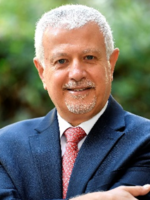October 7, 2021
About this seminar
Addressing the challenges of food and water scarcity in drylands requires a paradigm shift that acknowledges the nexus between water and energy for food and nutrition. Problems such as access to clean water, energy, nutritious food, and health care are expected to increase with climate change, changing demographics, and socio-economic uncertainties. Understanding the interconnectivities between the primary resources will catalyze the tradeoff analysis necessary for the sustainable management of these scarce resources. A plant-based diet, such as the “planetary health diet” proposed by the EAT-Lancet commission and followed by Mediterranean countries for centuries, promotes human health and reduces environmental strain. In this presentation we ask the basic questions: can the Mediterranean diet be produced sustainably; what is the impact on the limited water and energy resources; what are the tradeoffs of water and energy to increase self-sufficiency for the local food basket and trade; and how does this impact the environmental footprint? A case study based on a joint project among FAO, TAMU and AUB from Lebanon will be presented.
Professor Rabi H. Mohtar, Department of Biological and Agricultural Engineering and the Zachry Department of Civil and Environmental Engineering at Texas A&M University, founded the Texas A&M Water-Energy-Food Nexus Initiative (2015). He served as dean of the Faculty of Agricultural and Food Sciences (2018-2021) at the American University of Beirut, where he also established the Water-Energy-Food-Health Nexus Renewable Resources Initiative (WEFRAH). At Purdue University (1996-2014), Mohtar was the inaugural director of Purdue’s Global Engineering Programs (2008) and a founding member of Purdue’s Division of Environmental and Ecological Engineering (2006). Mohtar’s research focuses on global resource challenges and development of a Water-Energy-Food Nexus framework for linking science and policy; characterization of the soil-water medium using thermodynamic modeling; efficacy of non-traditional water, and applications for sustainable integrated water management such as implementation of the Sustainable Development Goals (SDGs) Mohtar serves as a Governor of the World Water Council, is an Executive Board member of IWRA, a Distinguished Alumnus of AUB, Senior Fellow at the Policy Center for the NewSouth, and a Fellow of the American Society of Agricultural and Biological Engineers.
About the Speaker


